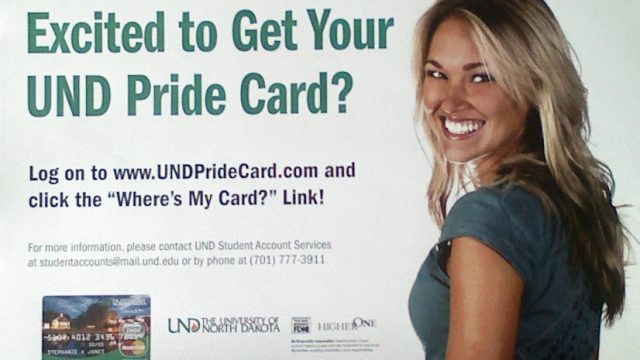UND Students Get Settlement Emails Over Controversial Student Loan Debit Cards

In 2008 the University of North Dakota, lead in the matter by Associate Vice President of Finance and Operations Peggy Lucke, contracted with a company called HigherOne to disburse financial aid dollars to students in excess of what they owed the university.
HigherOne, which UND still uses to this day, gives students the option of getting the funds in a check, or putting them on a debit card managed by HigherOne which collected fees for the service.
Not all students liked the plan, arguing that HigherOne was difficult to work with, but the university pushed ahead anyway. “There’s pressure from a group of very vocal students that we should throw this out,” Lucke told Ryan Johnson, reporting for The Dakota Student (the UND student newspaper) on December 9th of 2008. “If we could work together and try to make it work and make it work better, I think that is the way we serve students.”
But not all students agreed. “That’s really just not the best thing to be doing with our financial aid,”Shane Gerbert, who helped lead the campaign against HigherOne at the University of North Dakota, told the Washington Post in 2010. “They’re siphoning it away little by little.”
Turns out Gerbert and his fellow students may have had a point.
Flash forward to 2014, and UND students are receiving notice of a class action lawsuit settlement over HigherOne charging excessive, among other issues.
You can see a PDF of a notice one UND student (who preferred to remain anonymous). “Plaintiffs claim that Defendants’ marketing did not adequately disclose the refund disbursement methods available to students for their tuition and financial aid refunds and that Defendants charged inadequately disclosed and otherwise improper fees, such as PIN Based Transaction Fees and Non-Higher One ATM Fees, for use of OneAccounts,” reads the notice. “Plaintiffs assert that Defendants’ practices breached the Account Terms and Conditions, unjustly enriched Defendants, and violated various state consumer protection laws. Defendants maintain that there was nothing wrong with their marketing and fee practices and that they did not violate any laws. The Court has not decided which side is right.”
While the court hasn’t ruled yet on which side is right, the notice states that there has been an agreement reached for $15 million for which UND students charged a fee by HigherOne may be eligible. In November a HigherOne spokeswoman said the accusations made by the student plaintiffs were “without merit,” but refused to comment on whether or not the settlement – if approved by the court – would include an admission of wrong-doing.
What’s interesting is that this settlement is coming even as the North Dakota University System tries to shift some blame for excessive student loan debt onto students. In June the North Dakota Student Association presented a survey to the NDUS indicating that students spend a lot of their student loan dollars on things other than education. The suggestion being that said spending, and not the cost of higher education itself, is driving the student loan problem.
Which is a little hard to swallow when universities like UND are pushing student loan-backed debit cards on students.
But keep in mind that higher education these days isn’t about serving students. It’s about harvesting as much cash as possible from students before sending them out into the real world.




